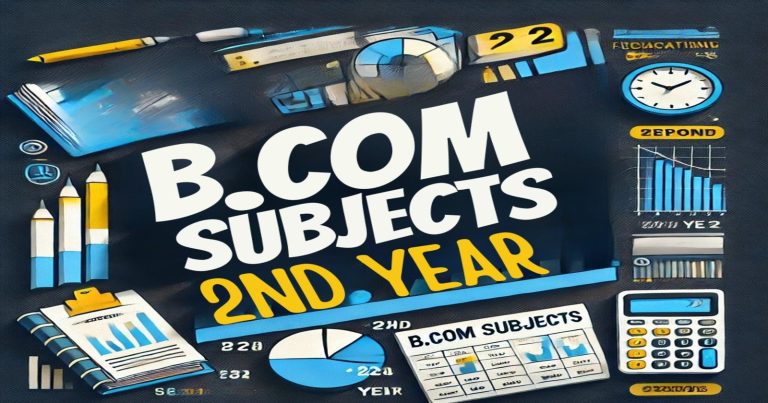The second year of a B.Com program deals with core business and commerce principles in more depth. B.Com 2nd-year subjects generally are Corporate Accounting, Business Law, Financial Management, Income Tax, and Auditing. These subjects add up to the knowledge gained from the first year of the course and enable students to understand advanced accounting practices, legal frameworks, and financial planning. This year, with a mix of theoretical and practical learning, students are equipped with all the essentials of a successful career in commerce.
What is B Com?
BCom is a broad undergraduate course focusing on many aspects of commerce and business. It is an all-inclusive program covering financial accounting, business law, economics, taxation, and management.
The B Com program is offered in different formats such as B Com General, B Com Hons, and specializations like CA after Bcom. This course readies the student for professional roles and competitive exams. Simultaneously, it is flexible enough to let students specialize in finance, marketing, or entrepreneurship.
B.com Subjects 2nd Year
In B.com 2nd year, the total number of subjects is 9. Among them, 4 subjects are covered in third semester and 5 in the fourth semester. Those subjects include Company Law, Income Tax Law & Practice, Cyber Crimes & Law, Computer Applications in Business, Corporate Accounting, Cost Accounting, E-Commerce, Investing in Stock Markets, and Personal Tax Planning.
| Subject | Core/Elective | Description |
| Company Law | Core | Laws on company formation and governance. |
| Corporate Accounting | Core | Accounting for companies and consolidations. |
| Income Tax Law & Practice | Core | Basics of tax laws and filing procedures. |
| Cost Accounting | Core | Costing, budgeting, and variance analysis. |
| Cyber Crimes & Laws | Elective | Cybersecurity and legal frameworks. |
| E-Commerce | Elective | Online business and payment systems. |
| Computer Applications in Business | Elective | Software tools for business operations. |
| Investing in Stock Markets | Elective | Stock market basics and portfolio management. |
| Personal Tax Planning | Elective | Tax-saving and personal finance management. |
B.com 3rd Semester Subjects
B.Com 3rd Semester covers subjects like Company Law, Income Tax Law & Practice, Cyber Crimes & Law, and Computer Applications in Business. This means that students are prepared with legal frameworks, tax provisions, cybersecurity, and digital tools for business operations.
- Company Law: This deals with the provisions of the Companies Act 2013, which aims to learn how to conduct business per the legal framework provided in India. This subject elaborates on the rules regarding different types of companies and incorporation, forms, procedures, and how to apply the essential legal documents involved in the operations and management of a company.
- Income Tax Law & Practice: Income Tax Law & Practice is a book that deals with laws relating to the levy of income tax in India. The book covers basic concepts in the law of income tax, five heads in which income is categorized to compute the income under Salaries and Income from House Property, and tax liability of individuals and firms and understand the provisions of filing return of income.
- Cyber Crimes & Law: Cyber crimes & law is a subject based on cybercrime and the application of cyber laws. This subject entails cyber risk arising from online activity, working safely with data sources, network and system-related issues concerning online transactions, and risks attached to online usage through various popular online platforms.
- Computer Applications in Business: Computer Applications in Business enables students to learn computer and computation skills using different ICT tools. It emphasizes the preparation of documents for communication, presentation of good work, computation in accountancy and finance, and analysis of business data.
B.com 4th Semester Subjects
B.Com 4th Semester subjects include Corporate Accounting, Cost Accounting, E-commerce, Stock Markets, and Personal Tax Planning, through which the students gain practical knowledge in financial reporting, cost management, online business operations, stock market basics, and effective tax planning strategies.
- Corporate Accounting: This accounting deals with several techniques for preparing accounting and financial statements. The various accounting treatments for share capital and debentures, preparation of company financial statements, cash flow statements, and presentation of consolidated balance sheets to holding companies are taught in corporate accounting.
- Cost Accounting: Cost accounting focuses on cost accounting principles, identification, analysis, and segregation of cost components, as well as cost ascertainment. It covers the conceptual framework of Cost Accounting, accounting and control of material and labour costs, accounting and control of material and labour costs, and the cost of products, jobs, contracts, processes and services.
- E-commerce: E-commerce revolves around concepts and techniques of E-Commerce along with applications. It takes up the base concept of e-commerce, emerging current business models, basic operations like sales and marketing and HR activities, the changing nature of the newer e-payment mechanisms, and most importantly, the critical elements of security, privacy issues along with all related ethical and legal concerns arising in e-commerce.
- Stock Markets: This module deals with the fundamental skills employed in the stock market. It includes the basics of Investing, the Investment Environment, Risk & Return, the Indian securities market, the EIC framework, and the Mutual funds market.
- Personal Tax Planning: This course will be related to basic income tax and planning knowledge. It includes tax planning, skills to minimize liability, tax planning strategy concerning income from house property and business, and tax planning strategies related to capital gains.
Best Bcom Colleges in India
Students can also opt for BCom courses from government colleges. In addition, the fee structure of government colleges is relatively cheaper than private colleges, so the students can choose the BCom specialisations and colleges that fit their budget.
| College | Location | Total Course Fees (Approx.) |
| Shri Ram College of Commerce (SRCC) | New Delhi | ₹29,000 |
| Hindu College | New Delhi | ₹26,870 |
| Hansraj College | New Delhi | ₹28,440 |
| Lady Shri Ram College for Women (LSR) | New Delhi | ₹24,990 |
| Goenka College of Commerce and Business Administration | Kolkata | ₹4,000 |
| Kirori Mal College | New Delhi | ₹16,760 |
Bcom Books in Second Year
Several books are on the market, but only a few are best for b.com 2nd year study.
| Subjects | Books | Authors |
| Company Law | Company Law | Krati Rajoria |
| Gower’s Principles of Modern Company Law | Paul L. Davies and L.C.B. Gower | |
| Income Tax Law & Practice | Systematic Approach to Income Tax | Girish Ahuja and Ravi Gupta |
| Students Guide to Income Tax | Vinod K. Singhania and Monica Singhania | |
| Cyber Crimes & Laws | Cyber Law: The Law of the Internet and Information Technology | Craig Brain |
| E-Business and Cyber Laws | J.P. Sharma and S. Kanojia | |
| Cyber Crime and Information Technology | J Rattan | |
| Computer Applications in Business | Computer Applications in Business | S.K. Sharma and Mansi Bansal |
| Computer Applications in Business | Sushila Madan | |
| Corporate Accounting | Corporate Accounting | Bhushan Kumar Goyal |
| Corporate Accounting | Alok Kumar | |
| Concept Building Approach to Corporate Accounting | Raj Kumar Sah | |
| Cost Accounting | Cost Accounting: Principles and Methods | S.P. Jain and K.L. Narang |
| Fundamentals of Cost Accounting | H.V. Jhamb | |
| E-Commerce | E-Commerce | K.K. Bajaj and Debjani Nag |
| Electronic commerce: A Managerial perspective | E. Turban | |
| Investing in Stock Markets | Investing in Stock Markets | V. Kumar and R.S. Nangia |
| Investing in Stock Markets | J.K. Singh and Amit Kumar Singh | |
| Personal Tax Planning | Corporate Tax Planning and Management | G. Ahuja and R. Gupta |
| Direct Taxes Law & Practice – With special reference to Tax Planning | Vinod K. Singhania and K. Singhania |
B.com Subjects 2nd Year FAQs
1. What are B.Com 2nd year topics?
B.com’s 2nd-year topics covered are Corporate Accounting, Business Law, Financial Management, Income Tax, Auditing, Economics, and Business Communication in most universities, but these may vary according to the university’s syllabus.
2. Are B.COM 2nd year topics are same for everyone?
Though common subjects are always there, like corporate accounting and business law, some electives vary by syllabus, like marketing management or e-commerce.
3. What subject in B.Com 2nd year is toughest?
Subjects such as Income Tax and Financial Management are a bit technical, so they require lots of practice and a proper understanding of the topics.
4. Does B.Com 2nd year subjects consist of practical study?
Yes, there are certain subjects like auditing and financial management, where one would work on case studies, problem-solving exercises, and other practical assignments to develop analytical skills.
5. How do I prepare effectively for the B.Com 2nd-year exams?
Core concepts should be understood and rewritten regularly, with numerical problems as well in accountancy and finance, and study the previous years’ question papers to prepare them.


